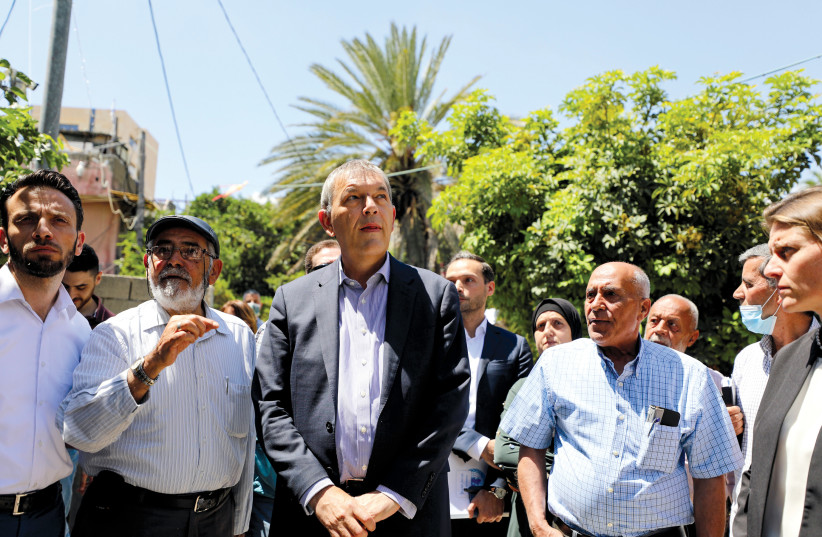Chronic underfunding of the United Nations Relief and Works Agency which services 5.6 million Palestinian refugees will lead to its collapse, warned UNRWA Commissioner-General Philippe Lazzarini.
“We are in an early waning mode right now. We have to avoid a situation where UNRWA crosses the tipping point,” he told reporters in New York on Friday, adding that “we have entered a danger zone.”
Lazzarini spoke one day after the UN held a pledging conference for UNRWA, which services Palestinian refugees in Syria, Lebanon, Jordan, Gaza, the West Bank and east Jerusalem.
Donor countries committed to $160 million, which allows the agency to operate for the next few months, he explained.
"To illustrate austerity, think of 50 children in one classroom, double shifts within schools, or a medical visit where a doctor spends less than 3 minutes with a patient."
Philippe Lazzarini

“We can run our operations until September,” Lazzarini said, adding that after that, “I do not know if we will get the necessary cash to allow us to pay the salaries.”
Part of the problem is that “UNRWA is expected to provide government-like services but is funded as if it was an NGO,” he said.
The UN is set to renew its mandate this fall, as it does every three years.
It’s not enough for UN member states to vote to allow UNRWA to continue to operate, Lazzarini told the donor conference on Thursday. They must also provide the necessary funds for the agency to execute its mandate. Eventually, failure to do so would “push the agency towards financial collapse,” he said, adding that he feared that day was fast approaching.
“For years, we managed the chronic underfunding through internal measures such as cost control, austerity and zero-growth budgets,” he said.
“Today, we have depleted our financial reserves and reached the limits of cost control and austerity measures,” he explained, adding that, “austerity now affects the quality of the services.”
“We are not in a position anymore to adopt austerity and cost control measures of the size of the funding gap,” he said.
A FUNDING failure now would put at risk the education of half a million girls and boys as well as the primary health care for close to two million people, the commissioner explained.
“To illustrate austerity, think of 50 children in one classroom, double shifts within schools, or a medical visit where a doctor spends less than three minutes with a patient.”
The pace of donations, he said, cannot keep up with the needs of a growing population.
At issue, in particular, is funding for UNRWA’s $817 million core needs, out of its $1.6 billion budget, which includes education and health care. As of mid-June, donor countries had sent the agency only $313 million toward that core budget.
“We need US $817 million – the full US $817 million,” Lazzarini said.
Not a new problem
UNRWA has long been in financial distress, but the situation has become more acute in light of the COVID-19 pandemic and the Russian-Ukrainian war.
“The situation in Ukraine has exacerbated the noticeable increase in food and commodity prices, seriously affecting the household economy of Palestine refugees,” Lazzarini said.
Poverty rates have reached 80% in Lebanon, Syria and Gaza, where “too many Palestine refugees report living with one meal a day,” he said.
“I have appealed to all donors to ensure that Palestine refugees are not a collateral of the events in Ukraine.”
DEPUTY US Ambassador to the UN Nicholas Hill told the donor conference that the Biden administration was strongly committed to UNRWA.
America “is proud to be the agency’s largest single donor. We contributed $338 million to UNRWA’s work in 2021 and have already announced $79 million for 2022,” Hill said, adding that “we intend to provide additional support to UNRWA this year.”
The former Trump administration had cut all US funding to UNRWA, explaining that the organization was in need of financial reform and that Palestinians could be better serviced in other ways. It had echoed concerns voiced by Israel that the agency allowed for an ever-expanding class of refugees, by providing assistance to descendants of the 750,000 Palestinians that were displaced during the 1948 War of Independence.
Israel and opponents of UNRWA have also charged that there are instances of antisemitism and anti-Israel incitement in textbooks used by the agency in its classroom.
On Thursday, just prior to the pledging conference, the Geneva-based NGO UN Watch released a report charging that some UNRWA teachers and staff had engaged in incitement against Jews and Israel on their social media accounts.
Israel’s Ambassador to the UN Gilad Erdan wrote a letter to Lazzarini on Thursday, asking that he dismiss all employees who encourage terrorism and antisemitism.
The commissioner-general told reporters in New York on Friday that UNRWA “has zero tolerance when it comes to incitement to violence and discrimination.
“Whenever we are confronted with a situation where indeed there is a breach of UN values, the agency will take all the necessary measures,” he stressed. “If misconduct is identified we will take measures in line with UN policies.”
He speculated that it was not a coincidence that the report, which includes some of those charges, was released on the day of the pledging conference, noting that there were those who wanted to delegitimize the agency.
“There has been an increase in activities by a number of detractors to try to delegitimize the agency and not to acknowledge all the efforts put by the agency to deal with this situation,” Lazzarini said.
